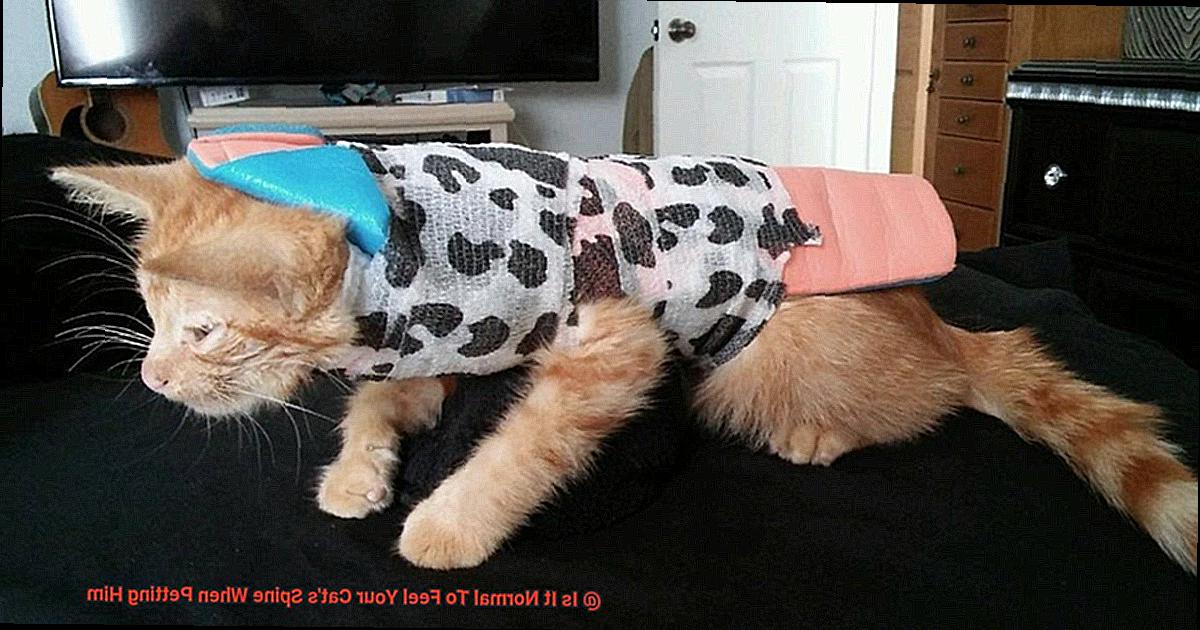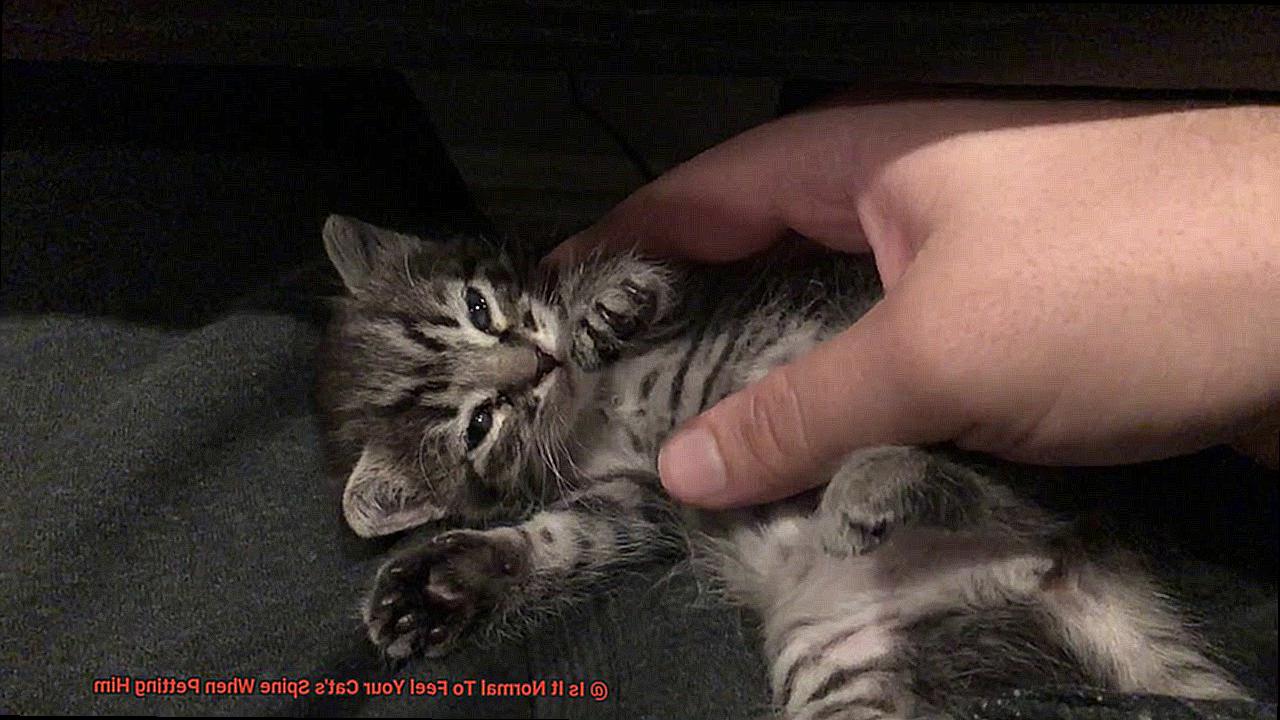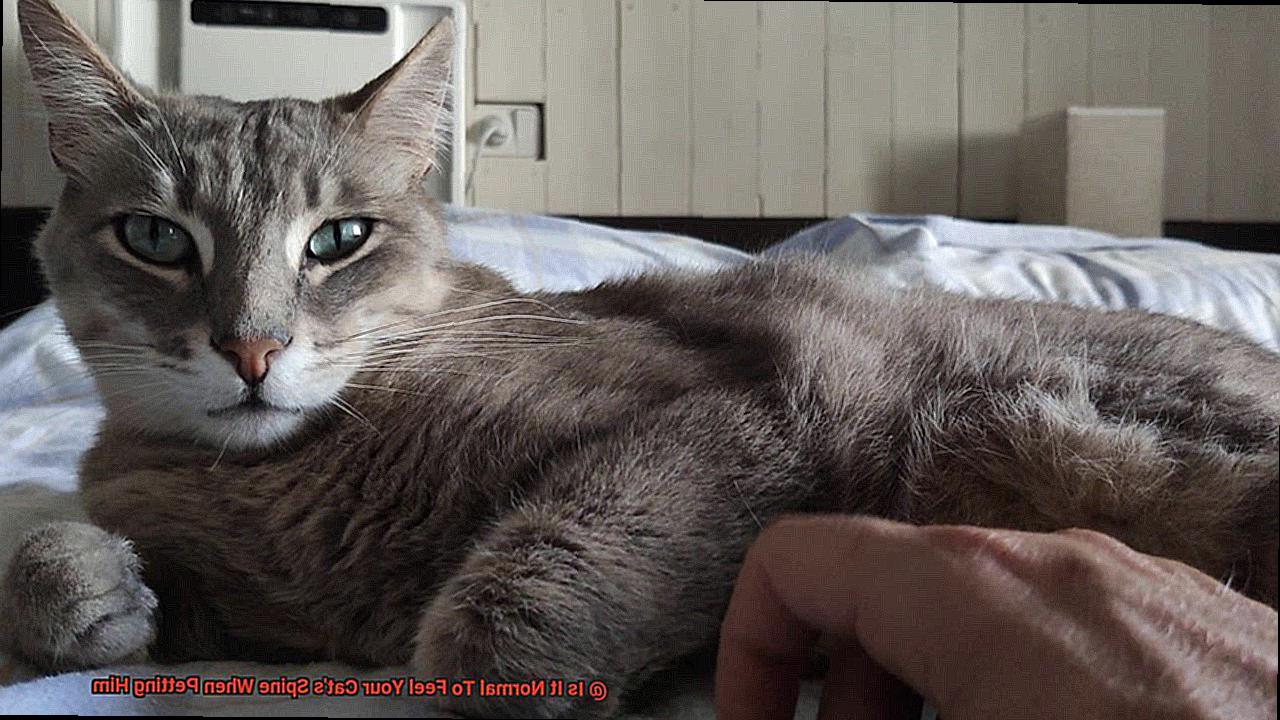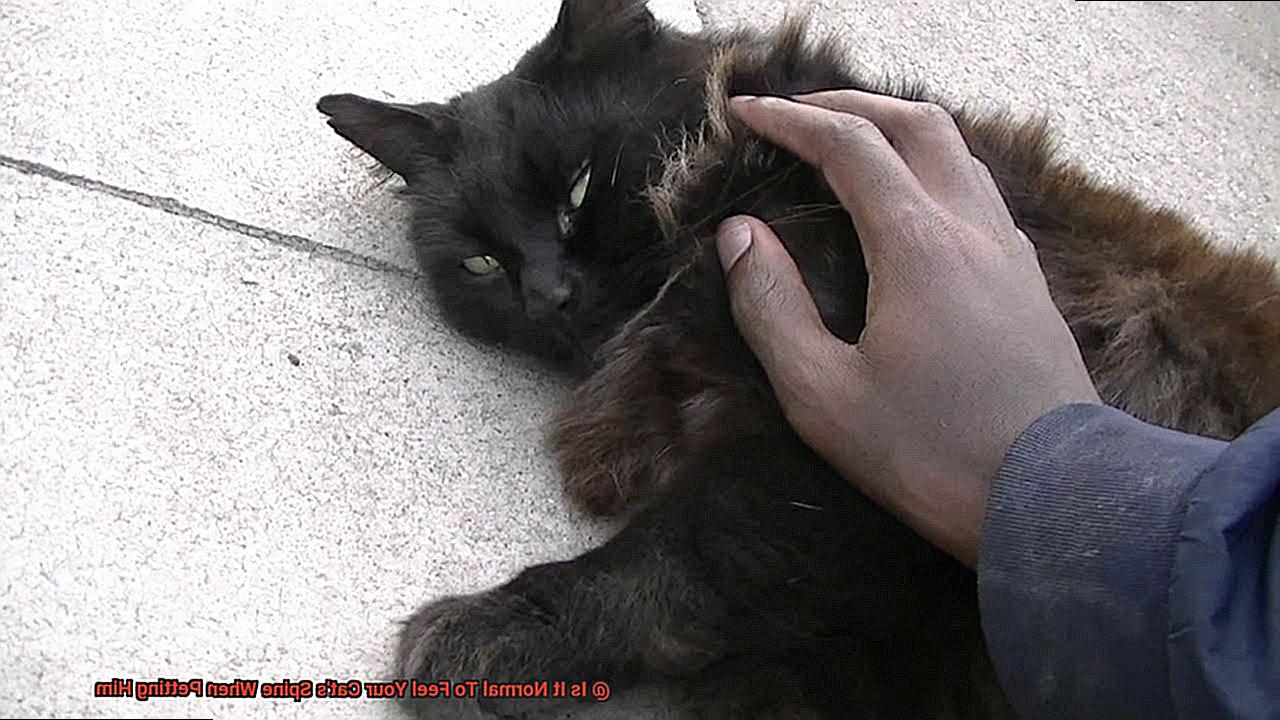As a cat owner, you know that petting your furry companion can be a relaxing and therapeutic experience. But have you ever felt a slight bulge along your cat’s spine while giving them some love? If so, you might be wondering, “Is it normal to feel my cat’s spine when petting them?”
The answer is a resounding yes. Feeling your cat’s spine is completely natural and normal. Just like in humans, the spine is the backbone of your feline friend’s anatomy. It consists of a series of bony vertebrae that provide support for their body and protect their nervous system. So it’s no surprise that you can feel the line of bones running down their back.
However, it’s important to note that feeling your cat’s spine should not be confused with feeling their ribs or hip bones. If those areas are protruding, it could indicate an undernourished cat. In this article, we’ll explore why you might feel your cat’s spine and what signs to look out for regarding their overall health.
So, let’s dive in.
What is a Cat’s Spine Made of?
Made up of a series of small vertebrae, the spine is supported by cartilage and ligaments that provide stability and flexibility for graceful movements.
When you pet your cat and feel their spine under your fingertips, you’ll notice each vertebrae moving in response to your touch. This is because a cat’s spine is incredibly versatile, allowing them to twist and turn in remarkable ways.
Beyond movement, the spine also has a vital role in the nervous system. Nerves run throughout the length of the spine, transmitting messages between the brain and the body, allowing cats to feel sensations such as heat, cold, and pressure. The spinal cord, a long thin bundle of nerves, runs through the center of the vertebrae and is responsible for many essential bodily functions.
It’s crucial to be gentle when touching your cat’s spine. If they seem to be in pain or discomfort when touched, it could be a sign of an underlying medical condition that requires attention from a veterinarian.
However, for most cats, feeling their spine is a natural part of petting them.
Is it Normal to Feel Your Cat’s Spine When Petting Them?
The answer is yes, and it’s actually a sign that your kitty is at a healthy weight. Feeling your cat’s spine when petting them is completely normal and healthy, but there are some things to keep in mind.
Firstly, it’s essential to be gentle when touching your cat’s spine. Cats have sensitive spines, and too much pressure can cause discomfort or even pain. So, avoid pressing down on the spine or rubbing it vigorously. Instead, use light strokes to caress your kitty’s back gently.
Secondly, keep an eye out for any unusual changes in your cat’s spine. If you notice any bumps or lumps, it could be a sign of an underlying health issue such as arthritis or a spinal injury. In such cases, it’s best to take your cat to the vet for an examination.
Lastly, not all cats enjoy having their spines touched. Some may become agitated or even aggressive if you touch their spine. It’s crucial to pay close attention to their body language and vocalizations to understand if they are comfortable or not.
In conclusion, feeling your cat’s spine when petting them is a natural part of bonding with your furry friend. It indicates that they are at a healthy weight and living their best life. However, it’s crucial to be gentle and aware of any changes in their spine to maintain their overall health and happiness.
Benefits of Feeling Your Cat’s Spine When Petting Them
- Firstly, petting your cat’s spine is an excellent way to strengthen the bond between you and your feline friend. As you stroke their back, your cat will feel a sense of comfort and security, which will help to build trust and affection between the two of you.
- Secondly, petting your cat’s spine can help to promote relaxation and reduce stress levels. Cats tend to carry a lot of tension in their back muscles, which can cause stiffness and discomfort. By massaging their spine gently, you can help release this tension and enable them to feel more relaxed and comfortable. This way, your cat can enjoy a more peaceful and stress-free life.
- Thirdly, feeling your cat’s spine when petting them can help you detect any potential health problems early on. When you run your hands over their back, you can feel for any abnormalities such as bumps, lumps or other irregularities. Catching these issues early on can help you seek medical treatment before they become more severe.
Feeling your cat’s spine when petting them is a normal behavior that provides both physical and emotional benefits for both you and your feline friend. By incorporating this into your daily routine, you can strengthen the bond with your cat while promoting their overall health and well-being.
Signs That Something May Be Wrong
However, it’s crucial to remember that our furry companions can’t always tell us when they’re feeling unwell. That’s why it’s essential to be mindful of your cat’s behavior during petting sessions and watch out for any signs that may indicate a health problem.
One of the most common areas to check during petting is your cat’s spine. While it’s typical to feel bones and muscles, certain signs may suggest something is wrong. For instance, if your cat becomes agitated or starts growling or hissing when you touch their spine, this could be a sign of pain or discomfort. It’s crucial to stop petting them immediately and consult with your veterinarian to rule out any underlying health issues.
Another red flag is if you feel any lumps or bumps along your cat’s spine. These could signify more severe health problems, such as tumors or cysts. If you detect anything unusual during petting, it’s vital to have your cat examined by a veterinarian as soon as possible.
But what other signs should you look out for? Changes in appetite or energy levels, excessive grooming or scratching, and vomiting or diarrhea are all indications that your cat may not be feeling well. If you notice any of these symptoms in addition to feeling something abnormal on their spine during petting, it’s essential to seek veterinary care right away.
While petting your cat can be a delightful bonding experience, it’s essential to be aware of their behavior and body language for any signs of discomfort or underlying health issues.
How to Comfort an Uncomfortable Cat
As a cat lover, you know that your feline friend can sometimes feel anxious or uneasy. Whether it’s due to illness, anxiety, fear, or pain, there are steps you can take to help comfort them. Here are five sub-sections to explain how to comfort an uncomfortable cat:
Approach with Patience and Gentleness
Cats are sensitive creatures and can easily become frightened by sudden movements or loud noises. When your cat is feeling uneasy, it’s important to approach them with patience and gentleness. Take a slow and calm approach, and let them come to you on their own terms. Give them space if they need it and try to read their body language to see if they want more or less interaction.
Create a Safe and Cozy Space
Providing a safe and cozy space for your cat can help them feel more secure when they’re feeling uneasy. Consider setting up a comfortable bed, a cat tree, or even a cardboard box with a soft blanket inside. Make sure this space is located in a quiet area of your home where your cat won’t be disturbed. It’s also important to keep this area clean and well-maintained.

Use Soothing Scents
Cats respond well to soothing scents that help promote relaxation and reduce anxiety levels. You can use a diffuser with calming essential oils such as lavender or chamomile. Alternatively, you can use pheromone sprays or wipes designed specifically for cats, which can help reduce anxiety and promote relaxation.

Pay Attention to Petting Techniques
Petting your cat is an excellent way to bond with them and show affection. However, it’s important to pay attention to their body language and signals when doing so. Some cats may prefer gentle strokes along their back or sides, while others may prefer more firm pressure on certain areas. If your cat seems uncomfortable or tense when you pet them, try petting them in a different way or in a different location.
Take Them to the Vet if Needed
If your cat is experiencing physical discomfort or illness, it’s important to take them to the vet to get checked out. Your vet can recommend treatments or medications that can help ease their discomfort and make them feel more comfortable.

Be observant of any changes in their behavior, appetite, or litter box habits, and don’t hesitate to seek professional help if needed.
Comforting an uncomfortable cat takes patience, love, and understanding. By creating a safe and comfortable environment for your feline friend, you can help them feel more at ease and reduce their anxiety levels.

OWLReUZI38Y” >
Common Medical Conditions That Could Cause Discomfort in Cats
Despite their grace and agility, cats can develop various medical conditions that can cause discomfort and pain. Let’s explore some of the most common medical conditions that can cause your cat to feel uncomfortable and what you can do to help.
Arthritis
Arthritis is a degenerative joint disease that affects cats of all ages. It can cause stiffness, pain, and discomfort in the joints, making it challenging for your cat to move around comfortably. Imagine walking around with painful knees all day – it’s not a pleasant feeling.
Similarly, your feline friend feels the same. If you notice that your cat is hesitant to jump or climb or seems to be in pain when moving around, it’s crucial to take them to the vet for an evaluation.
With proper treatment and medication, your cat can live a more comfortable life devoid of pain and discomfort.

Intervertebral disc disease
Intervertebral disc disease (IVDD) is another condition that can cause discomfort in cats. It occurs when the discs between the vertebrae in the spine start to degenerate, causing pain and discomfort in your cat. Think of it like having a slipped disc in your back – it’s painful and makes movement difficult. Symptoms of IVDD may include weakness in the legs, difficulty walking, and an arched back. If you notice any of these symptoms in your cat, it’s crucial to seek medical attention right away.
Besides arthritis and IVDD, urinary tract infections, dental problems, and digestive issues are other medical conditions that can cause discomfort in cats. These conditions can be painful and affect their quality of life. If you observe any signs of discomfort or pain when you touch their spine or any other part of their body, it’s vital to take them to the vet for an evaluation. Early intervention and proper treatment can prevent these conditions from worsening.
Cats are susceptible to various medical conditions that can cause discomfort and pain. As a responsible pet owner, it’s crucial to watch for any signs of discomfort or pain in your cat. If you notice anything out of the ordinary, take them to the vet for an evaluation.
Also Read: Why Do Cats Go Limp When You Pick Them Up?
Conclusion
To sum it up, feeling your cat’s spine when petting them is perfectly normal and healthy. It shows that your furry friend is at a healthy weight and is a natural way to bond with them. However, remember to be gentle when touching their spine as cats have sensitive spines, and applying too much pressure can cause discomfort or pain.
Moreover, keep an eye out for any unusual changes in your cat’s spine as lumps or bumps could indicate an underlying health issue such as arthritis or a spinal injury. Petting your cat’s spine has numerous benefits, including strengthening the bond between you and your feline friend, promoting relaxation, reducing stress levels, and detecting any potential health problems early on.
It’s crucial to pay attention to your cat’s behavior during petting sessions and look out for any signs of discomfort or underlying health issues. If they become agitated or start growling or hissing when you touch their spine, this could be a sign of pain or discomfort. In such cases, stop petting them immediately and consult with your veterinarian to rule out any underlying health issues.







